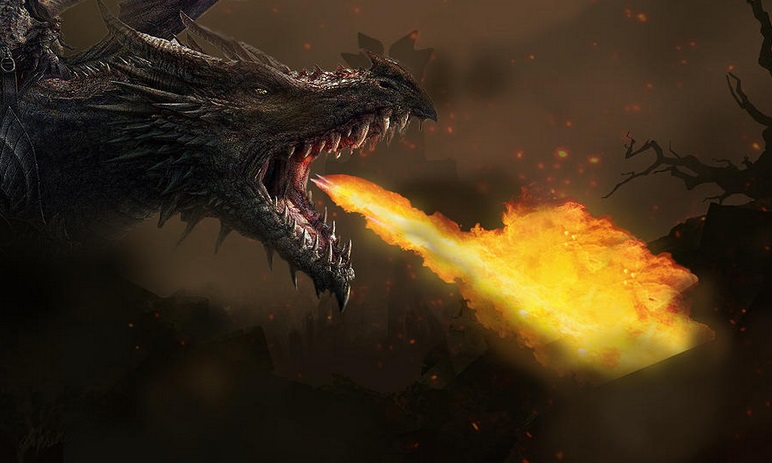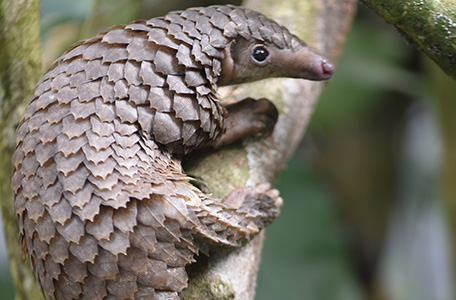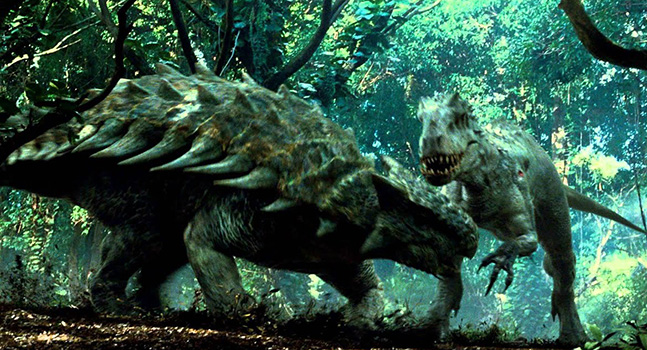Scripture References
Many times the Bible speaks of "dragons", especially in the Old Testament, though some versions have translated this word as "jackal". One must remember that none of the writers of the Holy Scriptures had ever heard of the word "dinosaur", so they came up with their own word to describe fearsome beasts.
Dragons have always been portrayed in art as having fierce, gargoyle-like faces. Interestingly enough, "gargoyle" is a French word, originating from "dragons which roamed the riverbanks" in times past. This certainly fits the description of leviathan, though it spent most of its time in the water. And large, fearsome animals in Bible times were called "dragons".
Job 41:1-5
Can you pull in Leviathan with a fishhook
or tie down its tongue with a rope?
Can you put a cord through its nose
or pierce its jaw with a hook?
Will it keep begging you for mercy?
Will it speak to you with gentle words?
Will it make an agreement with you
for you to take it as your slave for life?
Can you make a pet of it like a bird
or put it on a leash for the young women in your house?
This creature, like behemoth, was impossible to capture. Not necessarily because of its size, but because it was such a fearsome animal!
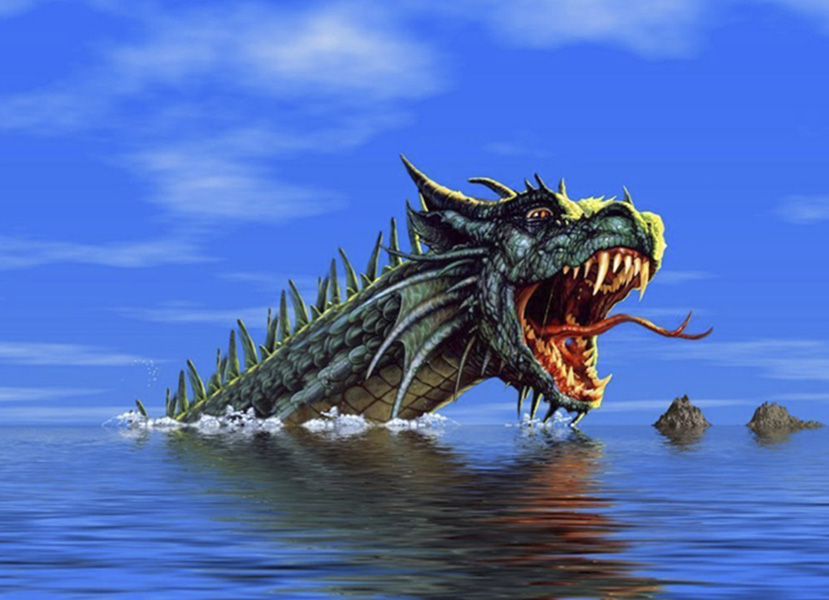
v.7-8
Can you fill its hide with harpoons
or its head with fishing spears?
If you lay a hand on it,
you will remember the struggle and never do it again!
Any hope of subduing it is false.
Like behemoth, this creature couldn't be captured - unlike the hippo or the crocodile (the absurd suggestions by the NIV translators in the notes). Moreover, its hide was virtually impervious to even spears and harpoons. One interesting point is the weapon "harpoon," as this is a weapon for hunting creatures in the sea. So this animal mainly resided in the water - again, like behemoth, although it doesn't mean that it was a fish like a plesiosaur or kronosaurus.
v
.9
The mere sight of it is overpowering.
The sight of a crocodile, even a massive one, can be impressive, but it's not overpowering. Far from it. A Hollywood version of a dragon (minus the obligatory wings, of course), seen coming out of the woods, would be overpowering, and I tend to believe that the Hollywood version is probably more accurate to what the real thing looked like.
v.13
Who can strip off its outer coat?
Who can penetrate its double coat of armor?
Double coat of armor? This was indeed an animal impervious to attack. Its armor may have been similar to today's pangolin, only more so and to a larger degree. However, the scales on a pangolin aren't true armor; they're made of keratin, like our fingernails. Perhaps leviathan had something similar to what covered the back of an ankylosaurus, which was like rock.
v.14
Who dares open the doors of its mouth,
ringed about with fearsome teeth?
Leviathan's teeth were probably something like the teeth of a tyrannosaur. Its teeth were 12-inches-long, housed in a mouth with a bite force of 12,800 psi.
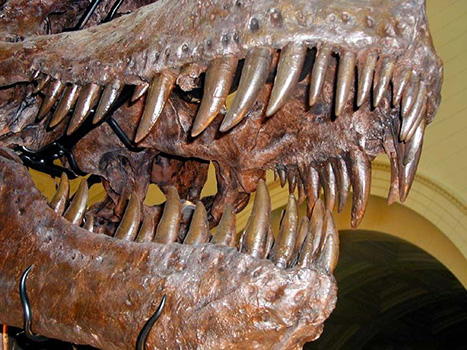
v.15-16
Its back has rows of shields
tightly sealed together;
each is so close to the next
that no air can pass between.
Imagine a semi-aquatic Tyrannosaur with rock-hard armor on its body.
v.18-21
Its snorting throws out flashes of light;
its eyes are like the rays of dawn.
Flames stream from its mouth;
sparks of fire shoot out.
Smoke pours from its nostrils
as from a boiling pot over burning reeds.
Its breath sets coals ablaze,
and flames dart from its mouth.
Here we go - leviathan's main weapon. I think that this is where we got our dragon legends from. This was such a terrifying and dangerous animal that its infamy spread to all corners of the globe, either by people seeing it firsthand or by word of mouth. This would make sense if there really was such a thing as a fire-breathing dragon. Parallels have been made between leviathan and the bombardier beetle, which can shoot out streams of boiling water at its enemies. Impressive, yes, but it's not like an animal breathing fire.
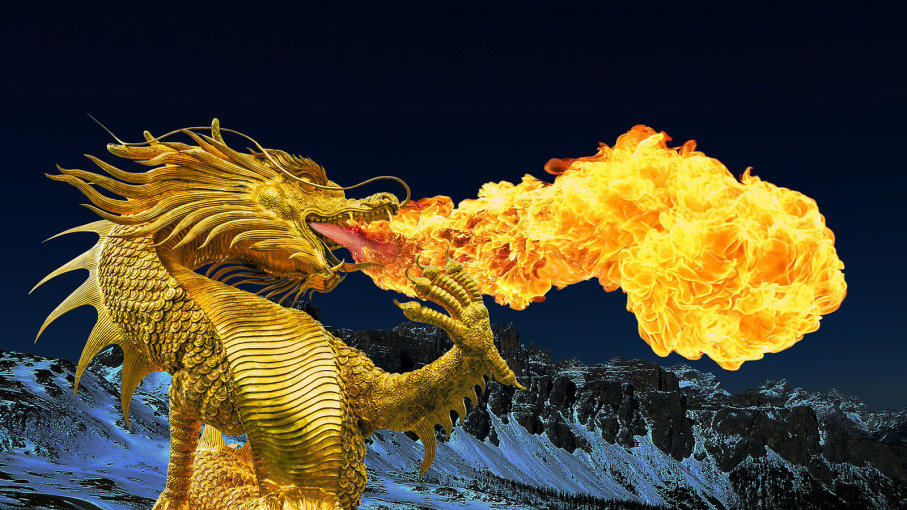
v.26-29
The sword that reaches it has no effect,
nor does the spear or the dart or the javelin.
Iron it treats like straw
and bronze like rotten wood.
Arrows do not make it flee;
slingstones are like chaff to it.
A club seems to it but a piece of straw;
it laughs at the rattling of the lance.
The strongest metals of the day - iron and bronze - had no effect on it. The hardiest weapons, the sword and spear, also no effect. One didn't try to kill or capture this animal - one just got out of its way.
Another interesting point here is that all these weapons - swords, spears, darts, javelins, arrows, slingstones, clubs, and lances are what one would use to hunt a LAND animal, not a large, dangerous fish like a plesiosaur, much less a whale. However, "harpoons" and "fishing spears" are mentioned in verses 7-8, so this suggests that leviathan was both aquatic AND terrestrial (like a hippo).
v.30
Its undersides are jagged potsherds,
leaving a trail in the mud like a threshing sledge.
"Leaving a trail in the mud." Sole water-dwellers like plesiosaurs and kronosaurs didn't come ashore; they had flippers and were fish, which converted oxygen in the water to breathe. This animal sounded like an air-breather which also occasionally came ashore, probably to feed or mate. Crocodiles, for example, certainly aren't fish, yet they spend 80% of their time in the water.
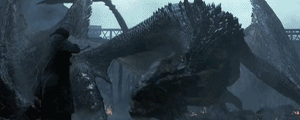
v.31
It makes the depths churn like a boiling caldron
and stirs up the sea like a pot of ointment.
It leaves a glistening wake behind it;
one would think the deep had white hair.
Leviathan was definitely a water-loving creature. The text mentions "the depths" and "the deep," so it probably didn't stay along the shoreline to feed. Rather, due to its massive size, it preferred to lurk in deeper water, where it would find bigger fish to feed its bigger appetite.
v.33
Nothing on earth is its equal—
a creature without fear.
And why SHOULD it fear? No attack on it would succeed, and even if one came, it could respond with 1. a flame-thrower or 2. the devouring ability of a tyrannosaur. |
